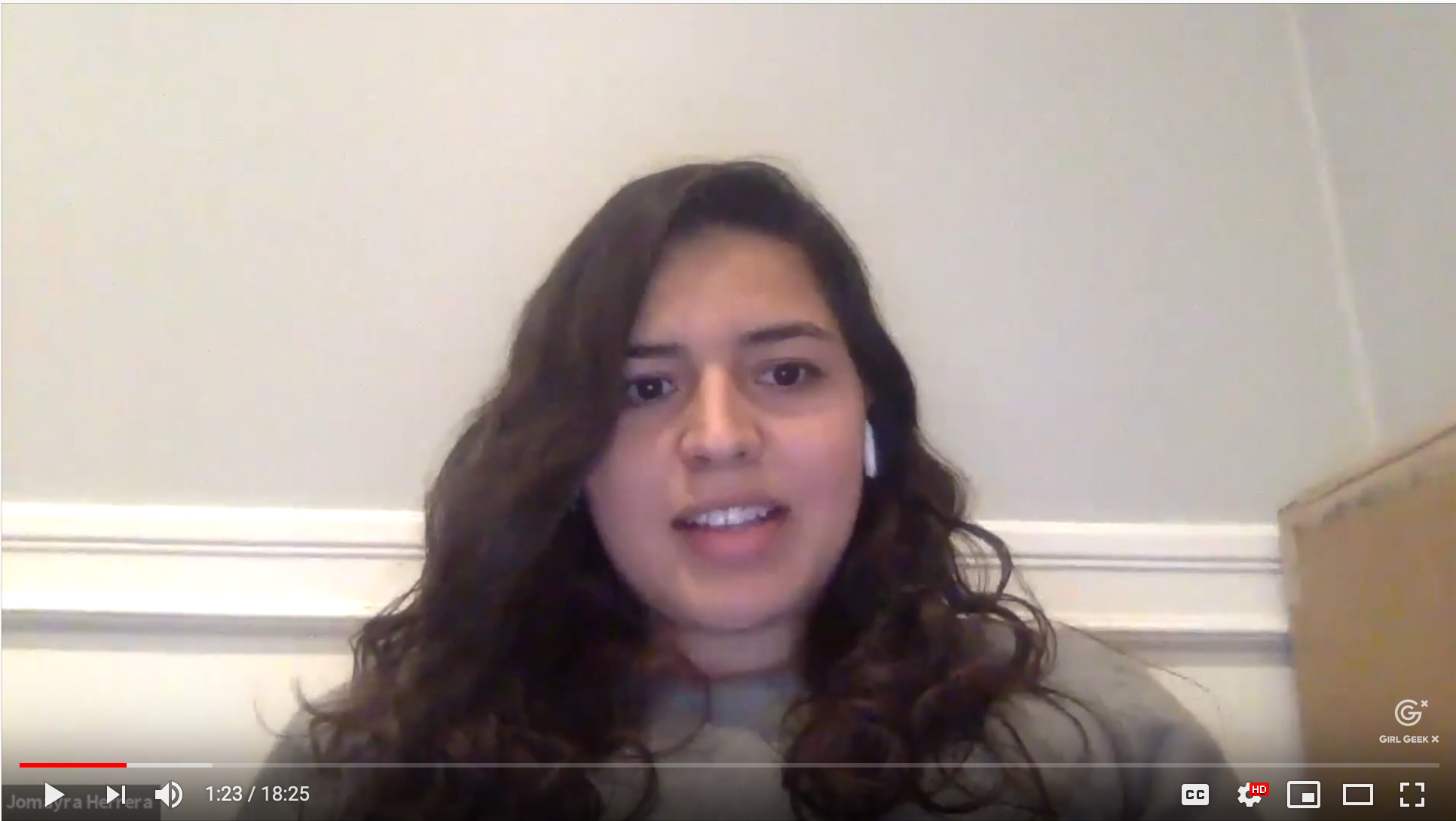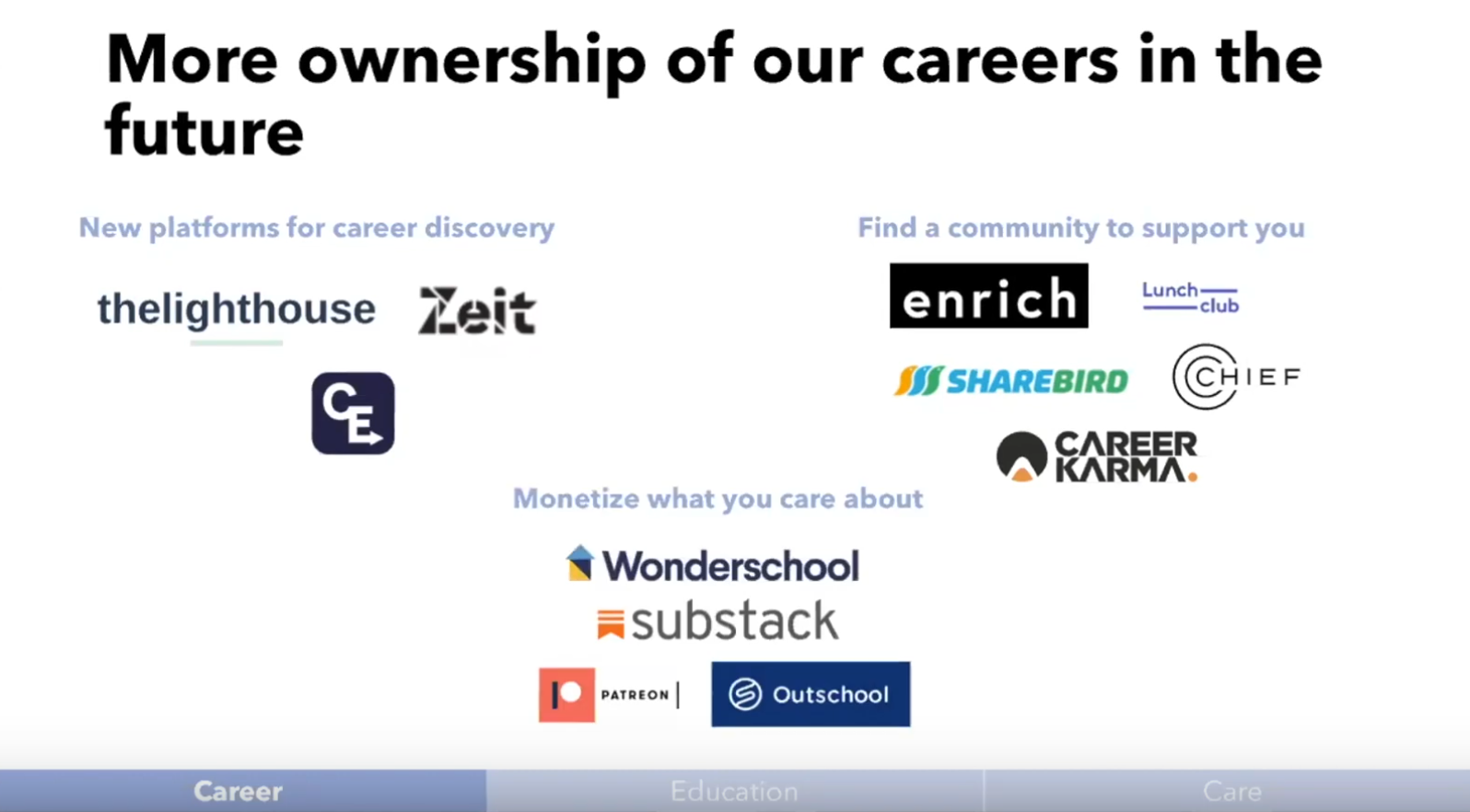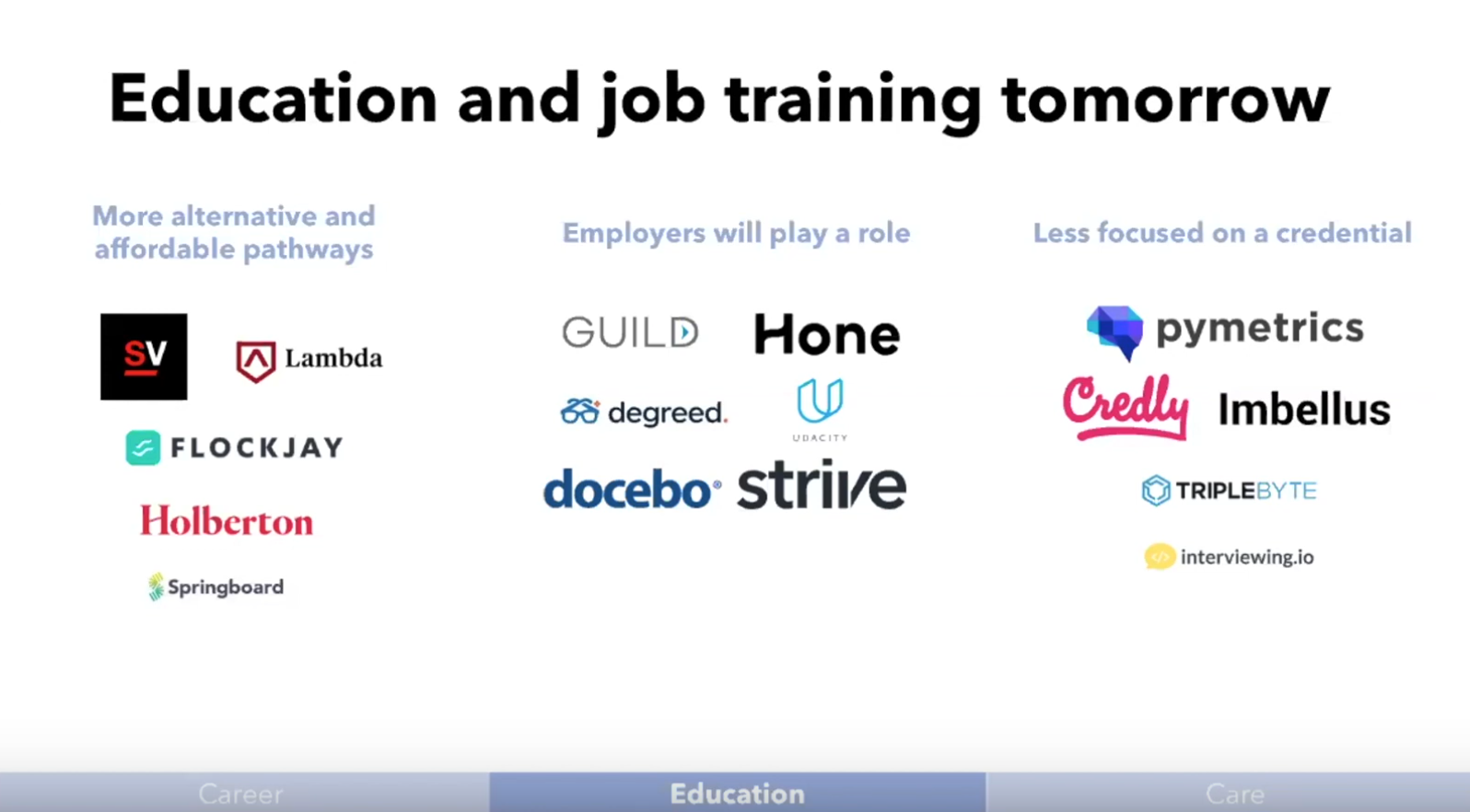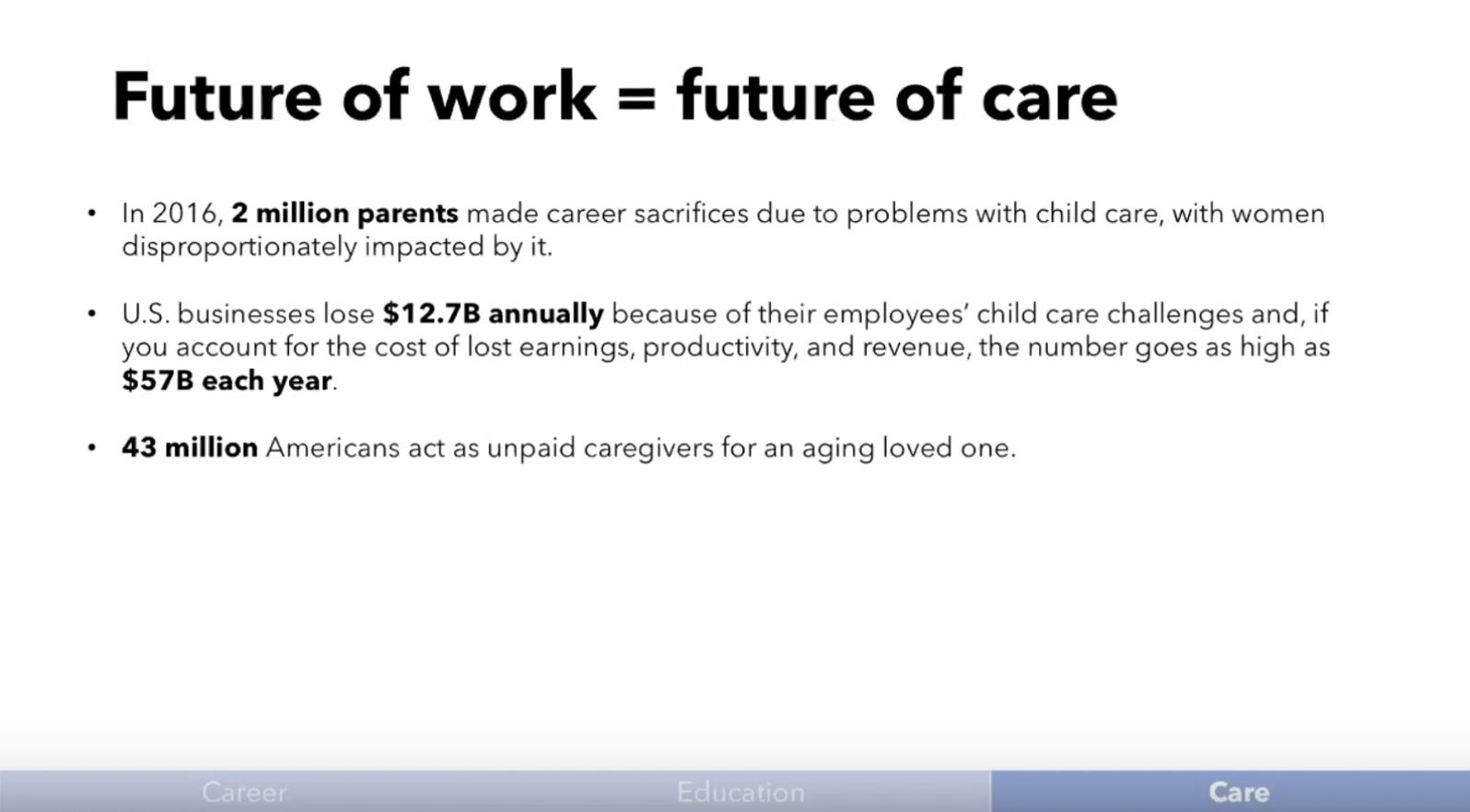VIDEO
“If you ask 10 different people what the future of work means, you will probably get 10 different answers” says Jomayra Herrera. In this session, she’ll share her thoughts on employment, education and child and elder care, how they intersect, and areas where she sees potential for innovation.
Transcript of Elevate 2020 Session
Angie Chang: Hi, welcome back. I’m Angie Chang, founder of Girl Geek X. We’re having to run through some really, really quick housekeeping items. We are recording today and we are getting this question a lot. These videos will be available on YouTube later. So subscribe to us at youtube.com/girlgeekX. And if you’re hosting a watch party, we’ve been enjoying seeing all the watch parties of people and their dogs. So please continue to tweet them at us.
Angie Chang: We love seeing your faces and hearing what you have been enjoying today. And you can also ask questions in the Q and A below. So feel free to ask questions. And our next speaker is Jomayra Herrera, who is an investor at Cowboy Ventures, where she works closely with the early stage founders, applying her expertise, investing in operating early stage growth companies. She will be sharing her ideas on employment, education, child and elder care, and how they intersect and potential areas for innovation… Jomayra.
Jomayra Herrera: Awesome. Okay. Well, thank you so much for spending the next 15 minutes or so with me. Hopefully, what I’m hoping to cover in this session is a little bit around how I think about the future of work, which is honestly a topic that you probably see a lot in the Twitter world. You probably see a lot around media and you see a ton of headlines around. I’m hoping to talk a little bit about my perspective, how I define it. Some of the things that I think fall under it and some of the areas of optimism. So with that, I thought it’d be helpful to maybe talk a little bit about my background and the perspective that I bring into it, because it might be helpful in getting a sense of what colors my perspective and how I think about the future of work and the way that I define it.
Jomayra Herrera: This is a picture of me and my mom when I was younger. My mom unfortunately, did not have the opportunity to finish high school. And I am the first in my family to go to a four year college. Because of that, I’m very lucky that I have the opportunity to be in a job and to be in a career that I think is meaningful and I find fulfilling and that I really love. And that also at the same time generates enough income to cover my expenses. But I know I’m lucky in that regard. And so I have spent the vast majority of my career actually focused on trying to create pathways or thinking through pathways to give folks access to meaningful jobs at scale. And so my background is that I actually went to graduate school for education, then went to work at an edtech startup. And that’s where I started my operating career.
Jomayra Herrera: And then spent three years after that at an organization called Emerson Collective, where I focused on investing in companies that were operating in the education and employment space. I, now, as Angie mentioned, work at Cowboy Ventures, we are a seed stage fund and early stage fund. We’re completely generalists, but I continue to have a passion and a focus around companies that operate in the future of work space, broadly defined as I’ll talk about in the next couple of minutes. Before jumping into how I think about the future of work, I think it’s worth taking a minute or so talking about what we see in the headlines. I think if we go off of, based off the headlines or what we often hear about the future of work, we think it’s very much doom and gloom.
Jomayra Herrera: It’s focused on AI automation. The robots are taking our jobs, or it’s focused on the distributed workforce or remote and collaboration software. All of which is true, none of which is untrue, but the conversation is more focused on the things that we’re going to lose. And it’s more focused on the ways that we can get more productivity and output out of employees and out of workers. And it’s less focused on how do we expect our relationship as workers and as employees, as humans rather, how do we expect our relationship with work to change over the next couple of years, as we start to see some major tectonic shifts around our relationship with work happen over the next decade. And so what I’m hoping to do in this presentation, is just expand how we think about the future of work and expand the way that we have the conversation around the future of work.
Jomayra Herrera: And hopefully talk about a couple of categories that I spend a lot of time thinking about. In this session, I’ll talk specifically about three categories, because I think that this could be a multi hour long presentation all on its own, but I’ll talk about our careers and how we think about career discovery and exploration and some of the areas of innovation that are happening there. I’ll talk about education. Some of the ways that we think about future of job training, both to and through our careers. And then also around the future of care, which unfortunately is very often left out of the future of work conversation, but is actually integral to how we think about work, moving forward. So starting with careers, the way we think about careers today, most of these stats you probably already know. And if you don’t, most of what we know about careers today is that this concept of having a lifelong career or a lifelong job is not really the same anymore.
Jomayra Herrera: You might have the same title for a significant period of time, but the underlying role in terms of what you’re going to do and what you’re expected to do is going to change. It’s going to change considerably faster than ever before moving forward. We know that currently the work activities that we do, so like the atomic unit under the actual job title, over 50% of those work activities can be automated today. We have the technology for it. The question is the pace at which it’s going to happen and the timeframe in which is going to happen. Which is where most of the debate is happening. We know that the half life of a learned skill is about five years. So the skills that we learn are probably going be obsolete in a couple of years, we know that the majority of people report being in bad or mediocre jobs and jobs are harder to predict than ever before. And the pace of change at which they’re changing and evolving is happening faster than ever before.
Jomayra Herrera: All of that is fairly doom and gloom. And I apologize for that, but that’s some of the reality in terms of where or how we think about careers today. Unfortunately, the way that we navigate our careers and explore and figure out and discover what we want to do to our careers is a fairly manual thing. There are quizzes. And if you’ve done any of these quizzes, I’ve gotten librarian, accountant, educator, babysitter, you name it. I’ve never gotten venture capitalist because I don’t think it accounts for your preferences, or I don’t even know if that’s part of the jobs that are in the consideration set, but they’re often not very accurate or very personalized to you. Or the vast majority of us actually just rely on our networks. What did our parents do? What did our family members do, or our cousins, our alumni, our friends, et cetera.
Jomayra Herrera: And you rely on their guidance and not necessarily rely on the guidance of data that’s actually available out there. And so what I’m excited about and where I think there is a ton of opportunity, is actually in the ability to change what I’m describing as in the ways that consumers, we now have more decision and agency and capability as ever before. And you see the rise of the conscious consumer as a result of that, and more intentionality in terms of how we spend our dollars and in terms of the products that we end up choosing and we end up using, I think we’re moving into a world where we’re going to see the rise of what I’m describing as the conscious worker. We’re going to have more optionality than ever before, more data than ever before, more agency than ever before.
Jomayra Herrera: And we’ll actually be able to be a lot more intentional and have a lot more ownership in terms of the careers that we decide to take. And there are a couple of things that enable this to happen. The first is, we’re seeing a rise of new platforms that help with career discovery. We’re seeing platforms that take into account, not only the data of the careers that are going to exist in the future, but also take into account in your preferences. What do you care about? What are you passionate about? What is the way that you want to have a dent in the world? And it gives you, and effectively acts as a guide of how do you actually think about exploring and discovering and finding the right career for you. In alignment with that, and I think it’s just as important as having the data, is we’re starting to see a rise of digital communities and sometimes the digital and in person actually mix, of folks, of communities that help you to achieve your goals, whatever they might be.
Jomayra Herrera: So Career Karma is a good example here. This, they started off by focusing on folks that want to do jobs in software, and they want to go to a coding boot camp in order to get to the end job. And so historically, the way that would work, is you kind of do it alone. And if you’ve tried to retrain alone, it’s really, really hard. Instead, you go on, you create a profile and they create a peer circle of folks that are like you and going through the same journey as you, and that peer circle effectively acts as your community as you go through this journey, which is a hard one in itself. So now we have a rise of platforms that help you to discover new careers, find new careers and find the right fit for you. And then now we have the ability to actually find the community that enables you to reach that end goal and get to that end goal.
Jomayra Herrera: And so we’re seeing, again, this movement towards having the tools and the capabilities to take ownership and have intentionality around your career process. And then the last thing that we’re seeing is actually just flipping this whole model on its head, which is the ability to not even rely on this concept of an employer to even generate your income in the first place. So this goes back to this idea of having more options than ever before. Self-employment isn’t new, but what is new is our platforms that help to enable new types of self-employment. So if you’re a writer, you no longer have to rely on large publishers to monetize your writing. You can use Substack. If you are an educator and you want to teach about art or poetry or creative writing, you can use Outschool and generate either supplemental income, or [inaudible] actually generates a majority of your income and have that optionality on your own.
Jomayra Herrera: So we’re moving into this world where you have more ownership over your career than ever before. And you’re becoming, again with the rise of options, the rise of data, and the rise of having actually access to communities that can help you, this world in which we tend, we have the ability to be this more conscious worker. So hopefully that leaves folks with this optimistic perspective that even though things are going to be automated, we’re actually moving into a world we’ll have more optionality than ever before. I know that was a ton, but just as important as the career aspect, it’s actually the education and the training to and through your career. Right now, just a couple of stats to give some background. We know that the majority of Americans don’t have a college degree. Of those that do, 40% of them are underemployed. They’re effectively in a career that they didn’t need the college degree to begin with.
Jomayra Herrera: Most training paths are outdated and out of touch with what the workplace and labor market needs. Alternative pathways are still fairly small scale. And when I say alternative pathways, I mean like the boot camps that you probably hear a lot about. For context, boot camps graduated about 23,000 graduates last year, compared to the 3 million associates and bachelors degrees that were awarded. So even though they take up a lot of mind space and a lot of Twitter space, they’re still fairly small in scale. Not meaning that they’re not significant or meaningful, but they’re still small compared to traditional institutions. And we know traditional options are expensive. There’s over $1.3 trillion in outstanding student loan debt. And unfortunately, tuition is going up and to the right instead of down, which is what we would hope and expect.
Jomayra Herrera: So education job training today right now is fairly inefficient, fairly manual, and often inaccessible for the vast majority of people. On a more optimistic perspective, I think there were a couple of trends and I’ll talk about three of them that are going to enable us to move into a world in which education is more lifelong, it’s more accessible and it’s more affordable and more linked to work, and what’s actually going to be helpful in the workplace. The first of which, is this idea around alternative and affordable pathways. Bootcamps have been around for a while. So we went through a bootcamp 1.0 phase where a lot of it was focused on software engineering, often required upfront payment and was fairly limited to a particular population. Oftentimes it was the literature major from Yale that realized he couldn’t get a job. And so they decided to be a software engineer and paid 30K upfront to do it.
Jomayra Herrera: We’re now moving into a world in which we’re in bootcamp 2.0, or maybe even 3.0, at this point, where we have more accessible options or online options, part-time options. There are more accessible, more affordable options. So leveraging new types of financial instruments like ISAs. And then what I think is the most important piece, we’re starting to see bootcamps evolve from just software engineering to more creative fields like digital marketing, or sales, or design, or product. Again, showcasing that there is more opportunity to create these alternative pathways that are more accessible and affordable in the vast majority of trades or in a vast majority of careers. We’re also seeing a rise of employers playing a more active role in the learning and development of their employees. A great example, and I’ll caveat this with this is a Cowboy portfolio company, is Guild Education. Guild Education enables employers like Walmart, Lowe’s, Disney, Discover, to give their frontline workers access to education.
Jomayra Herrera: And this is high school degrees, college degrees, and other forms of certifications that are important for their own upskilling and their own reskilling. And they don’t just provide access to the education. They also provide them access to coaches that help them navigate and get to and through their education. And so employers actually taking up the tab for that benefit. In the case of Hone or Strive, it’s focused on investing in managers, making sure that they’re growing as the company grows. And so while employers actually played an active role in learning and development around the seventies, the pendulum swung the other way over the past couple of decades. And now we’re seeing the pendulum swing back in the past few years, with continued investment in the reskilling and the upskilling of employees.
Jomayra Herrera: And then the last piece, and it’s almost an implication of the other two, is this movement towards less of a focus on the credential or the degree or the pedigree, and more focus on what you know, and the skills that you have and what you can do. As you start to see these alternative ways of learning and learning becoming more lifelong, this becomes more important than ever, especially if you’re trying to hire talent and retain talent. We’re still very early on in this shift, and I won’t lie, most applicant tracking systems still screen out the vast majority of resumes that don’t have traditional degrees, but as the labor market continues [inaudible] as those credentials. And as we see a rise of highly effective assessment, especially right now on the technical side, we are starting to see a shift towards [inaudible] skill-based hiring and hiring based off of what you know.
Jomayra Herrera: So there’s a lot to be optimistic about in where we see education and job training going, moving forward. The last thing I’ll talk about, and again, I know this is a ton of information, so I apologize for plowing through it. The last thing I’ll talk about is childcare and elder care, because unfortunately it’s often left out of the conversation. But if we think about the concept of you showing up to work and your loved ones, whether they be a young loved one or an aging loved one, not having access to the care that they need, you’re not going to bring your full self to work. And quite frankly, the pain and the friction of that just doesn’t work and it bears out in the numbers. Parents make sacrifices all the time for their childcare. That actually wraps up in terms of productivity losses, revenue losses, lost earnings, to estimate it over $57 billion a year, just in the US. And we know that over 40 million Americans act as an unpaid caregiver for an aging loved one.
Jomayra Herrera: This is something that actually isn’t sustainable and doesn’t scale over time. And so not only are we seeing a lot of innovation happening in this space, but it actually necessitates happening in this space if we expect to have this future of work in which folks have a more meaningful and healthy relationship with work. And so we’re already seeing a ton of innovation happening in the space around affordability, accessibility, and quality, both on the childcare side, which is the left hand column here. And then the elder care side, which is on the right hand column here, there’s still a lot of work left to be done. And in particular, this is an area where there is a lot of innovation that can happen. And there’s a lot of companies that are left to be made here, but there’s a lot of work that has to be done on the regulatory side and the policy side, to be able to scale any of these solutions and be able to unlock public dollars, to actually be able to give folks access to the care that they need.
Jomayra Herrera: But it’s one that’s incredibly important. And it’s often left out of the conversation, as we think about the future of work moving forward. I know that was a lot of information and I think I’m getting knocked out by Angie here. But I’ll just close by saying if there’s anything that you take from this is that the conversation around the future of work is much broader than just remote collaboration and productivity software. It includes your career. It includes childcare, eldercare. It includes financial security. There’s a lot of things that I didn’t talk about, like financial security and mobility, all of which are equally important. And so hopefully we can expand that conversation and we can be more optimistic about what it looks like.
Angie Chang: Awesome. Thank you so much, Jomayra. That was a fantastic talk. We have to wrap up the session. We have another session coming up in one minute, so thank you so much.






